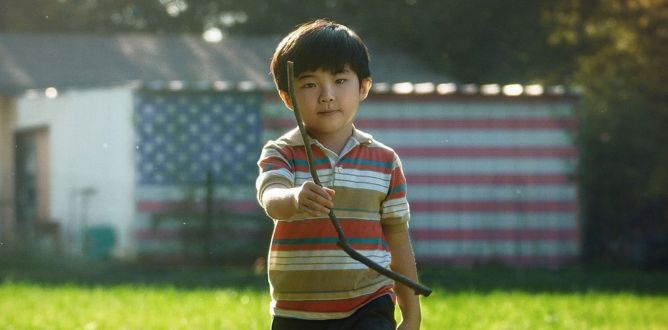Minari Parent Guide
Despite its slow pace and non-western story style, this amazing film is sure to produce a bountiful crop of empathy.
Parent Movie Review
It is the American dream that inspires Jacob and Monica Yi (Steven Yeun and Yeri Han) to emigrate from Korea to California. Two children and ten years of menial labor later, it is that same desire that drives Jacob to uproot his family again, this time transplanting them to a piece of Arkansas farmland that he hopes will prove fertile ground for both a vegetable garden and a better, more abundant life.
Although she follows her husband’s lead, Monica worries their situation is only moving from bad to worse. In the Golden State the family supported itself in the agricultural industry by inspecting young chickens to determine their gender. Employment at a similar company in Arkansas means they are doing the same work, just in a different location. While housing was modest in California, it’s now a mobile home parked in an isolated patch of weeds. With no family or friends in the sparsely populated vicinity, there is no one to provide care for the children. Neither are there any mentors for the aspiring famers trying to eke out an existence, unless you count the impoverished, strangely religious, Korean war veteran (Will Patton) who asks Jacob for a job.
From the perspective of the kids, Anne and David (Noel Cho and Alan S. Kim), the whole thing is a curious adventure – with a tendency to disappoint. This is especially true when their parents arrange to bring Monica’s mother from Korea to live with them and be their babysitter. Unlike any stereotypes popularized in American or Asian cultures, this unconventional Grandma (Youn Yuh-jung) swears, plays cards aggressively and is addicted to wrestling shows on TV. She’s also a formidable match for David’s sassy and mischievous ways.
Watching this struggling family is akin to waiting for a crop to grow. The faith of the spring planting is challenged by the hot summer sun, which casts doubts on the eventual harvest. Like Jacob, you hope for success. Yet like Monica, you fear failure as you observe the heat of financial stresses, marital conflicts and life problems threatening to dry up their dreams.
Despite its slow pace, non-western story style and use of frequent Korean dialogue with English subtitles, this amazing film is sure to produce a bounty of empathy. And not just for its portrayal of the immigrant experience. Many of the trials the Yi’s face are universal, such as overcoming pride while maintaining confidence, knowing when and when not to take risks, and learning what it really means to committ to providing for one’s family. Named after the hardy Asian herb Minari, this semi-autobiographical script (written and directed by Lee Isaac Chung), explores the kind of rocky soil that tests human tenacity, and demands it either shrink or flourish.
Directed by Lee Isaac Chung. Starring Steven Yeun, Yeri Han, Alan S Kim, Noel Cho, Youn Yuh-jung. Running time: 115 minutes. Theatrical release February 12, 2021. Updated October 2, 2021Watch the trailer for Minari
Minari
Rating & Content Info
Why is Minari rated PG-13? Minari is rated PG-13 by the MPAA for some thematic elements and a rude gesture
Violence: Some blood is shown when a child injures his leg. A child plays a mean prank resulting in an adult drinking urine. A child is threatened a couple of times with the punishment of being hit with a stick and is also forced to hold his hands above his head. A family’s safety is threatened by a tornado and a fire. The couple argues loudly and regularly. An angry wife throws a pillow at her husband. A person takes money out of a church’s collection plate. A TV program featuring wrestling is seen. Refences are made to killing and incinerating male chickens. A veiled reference to suicide is made. Characters put their lives at risk trying to protect their livelihood.
Sexual Content: A woman learns the English name for a male body part, which she repeats several times. People are shown “sexing chickens” where they examine baby chicks to determine their gender. Bed-wetting is depicted a couple of times, and a child hides his soiled underwear from his parents. A man’s bare chest is seen while he is taking a bath.
Profanity: Moderate and mild profanity is heard about ten times. A sexual finger gesture is seen. Anatomical and slang words for a male body part are repeated. Some insensitive racial comments are made, more out of ignorance than maliciousness. A child speaks hurtfully to his grandmother
Alcohol / Drug Use: A man is seen smoking on various occasions. Young children try chewing tobacco. A woman concocts an exotic brew, that includes deer antlers, as a home remedy for a sick child.
Other: Health problems are discussed and some medical procedures (such as an Ultrasound) are shown. A hyper-religious character prays vocally, tries to exorcise demons and carries a heavy cross. The name of Jesus is used in a religious context.
Page last updated October 2, 2021
Minari Parents' Guide
When young David asks his father Jacob about sexing chicks, Jacob has to tactfully explain the reason why female birds, who lay eggs, are more valuable than male birds. Jacob also tries to soften his explanation of the fate of the discarded fowl. Why do you think Jacob goes on to talk about men needing to be “useful”? What kind of things determine gender importance? How can specific circumstances change that evaluation? How do you feel about these gender inequalities?
Why do you think Jacob and Monica fight constantly? Do you tend to sympathize with one of them more than the other? How do you handle stressful situations? Why does Grandma conclude that once a Korean “comes to America, they forget everything”?
Korean Minari, also known as Chinese celery, Japanese parsley or water dropwort, is an herb used in many Asian dishes. Why do you think Lee Isaac Chung chose to name the movie after this vegetable?
Home Video
Related home video titles:
Avalon also explores the challenges of an immigrant family that arrives in Baltimore in 1914. Relationships between children and difficult elderly people are a depicted in Up and Secondhand Lions. A tender portrayal of another Asian family, and especially the bond between a grandma and granddaughter, can be seen in The Farewell.




